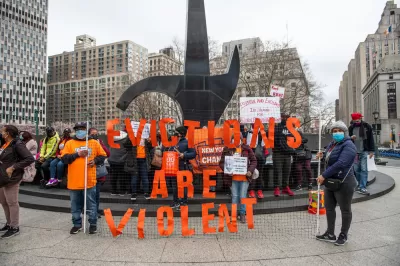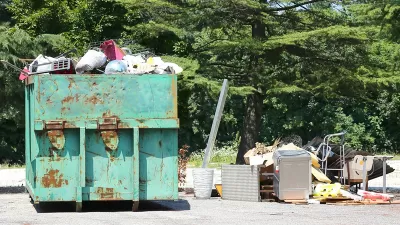HUD's new fair housing rule crucially overlooks the role of evictions in perpetuating residential segregation.

According to Devin Rutan and Renee Louis, "[t]he Biden Administration’s recent efforts to combat housing discrimination will fall short if they do not address eviction," commenting on the lack of eviction protections in HUD's reintroduced Affirmatively Furthering Fair Housing (AFFH) rule. "If the Biden Administration is serious about rooting out discrimination in rental housing and reducing segregation, it must incorporate eviction into its new fair housing rule."
The rule, which was introduced in 2015 and removed in 2018, "will require local governments to demonstrate that they are taking 'meaningful action' to promote fair housing markets, free from discrimination." But omitting eviction from the conversation leaves out a crucial element.
Nationwide, our research shows that Black Americans are significantly more likely to be evicted than their white peers. Nearly a quarter of Black tenants live in a county where the eviction rate for Black tenants is double the rate for white tenants. In Virginia, 60% of majority-Black neighborhoods have eviction rates greater than 10% — quadruple the national average. These racial disparities in eviction are even more extreme for Black women. And they're exactly the kinds of impacts the Fair Housing Act is meant to address.
Other factors that increase discrimination include family status, as "a family with children, all else being equal, is three times more likely to be evicted as another tenant who is also behind on the same amount of rent."
Despite the rule's intentions to promote fair housing, the authors conclude, "tenants with an eviction record, disproportionately Black women, are permanently locked out of most housing options. With millions of households facing eviction each year, any attempt by HUD at reducing segregation without explicitly addressing evictions will fall short."
FULL STORY: To Root Out Segregation, Biden Must Tackle Evictions

Planetizen Federal Action Tracker
A weekly monitor of how Trump’s orders and actions are impacting planners and planning in America.

Chicago’s Ghost Rails
Just beneath the surface of the modern city lie the remnants of its expansive early 20th-century streetcar system.

San Antonio and Austin are Fusing Into one Massive Megaregion
The region spanning the two central Texas cities is growing fast, posing challenges for local infrastructure and water supplies.

Since Zion's Shuttles Went Electric “The Smog is Gone”
Visitors to Zion National Park can enjoy the canyon via the nation’s first fully electric park shuttle system.

Trump Distributing DOT Safety Funds at 1/10 Rate of Biden
Funds for Safe Streets and other transportation safety and equity programs are being held up by administrative reviews and conflicts with the Trump administration’s priorities.

German Cities Subsidize Taxis for Women Amid Wave of Violence
Free or low-cost taxi rides can help women navigate cities more safely, but critics say the programs don't address the root causes of violence against women.
Urban Design for Planners 1: Software Tools
This six-course series explores essential urban design concepts using open source software and equips planners with the tools they need to participate fully in the urban design process.
Planning for Universal Design
Learn the tools for implementing Universal Design in planning regulations.
planning NEXT
Appalachian Highlands Housing Partners
Mpact (founded as Rail~Volution)
City of Camden Redevelopment Agency
City of Astoria
City of Portland
City of Laramie





























